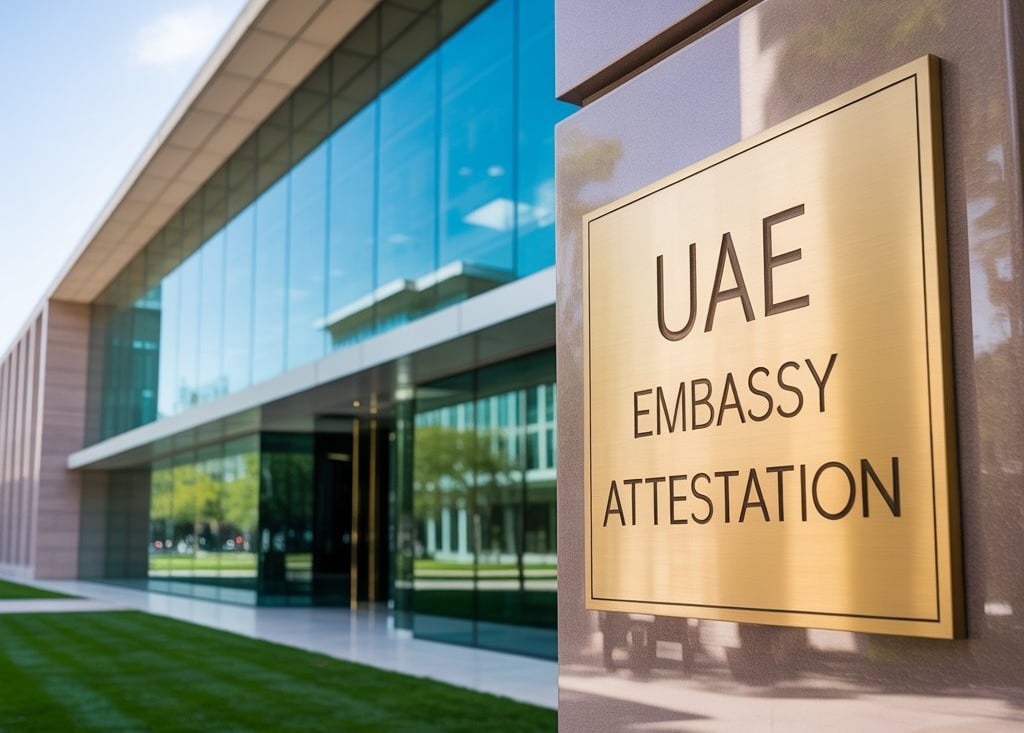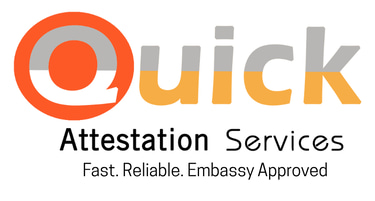Hassle-Free UAE Embassy Attestation Guide
Discover everything you need to know about hassle-free UAE embassy attestation, including the requirements and process involved. Ensure a smooth attestation experience with our comprehensive guide.
10/4/20257 min read


Understanding Embassy Attestation
Embassy attestation is a crucial process that serves to certify the authenticity of documents intended for use in a foreign nation. This procedure involves verifying that the documents in question, such as educational certificates, marriage licenses, and business documents, are legitimate and recognized by the government of the issuing country. In essence, embassy attestation establishes the credibility of these documents when they are presented abroad, thereby facilitating legal and administrative processes in foreign jurisdictions.
The significance of embassy attestation cannot be overstated. Each country has specific regulations that determine the acceptance of foreign documents. By certain regulations, embassy attestation ensures that the documents presented for use abroad meet the legal standards set by the host nation. Without this form of certification, documents may be deemed invalid, leading to potential complications in legal matters, migration processes, or business transactions. Thus, having documents properly attested is fundamental for individuals and businesses engaging in international activities.
It is important to distinguish embassy attestation from notarization and other certification processes. Notarization is typically concerned with the verification of a signature's authenticity and does not extend to validating the content or legitimacy of a document itself. Conversely, embassy attestation goes a step further by confirming that a document has been duly validated by the relevant authorities in the country of origin before being accepted by the embassy. This additional layer of verification makes embassy attestation a more comprehensive approval mechanism, crucial for ensuring that all documents are accepted without dispute when presented to foreign government bodies.
Types of Documents That Require Attestation
The process of UAE embassy attestation is essential for various types of documents, each serving a distinct purpose in legal and administrative contexts. One of the primary categories includes educational certificates. This encompasses degrees, diplomas, transcripts, and other academic credentials. Attestation of educational documents is often mandated for individuals seeking employment, further education, or professional licensing in the UAE. Such verification assures employers and educational institutions of the authenticity of the presented qualifications.
Another critical category comprises commercial documents. These include documents like incorporation certificates, partnership agreements, and business licenses. The UAE has rigorous legal requirements for businesses, and attestation of these documents is vital to establish the legitimacy of a company, facilitating smoother trade and investment activities. This helps prevent fraud and assures partners, clients, and government authorities of a business's legal status.
Additionally, personal documents also require attestation to be legally accepted in the UAE. This category includes marriage certificates, birth certificates, and divorce decrees. For expatriates living in the UAE, having these personal documents attested is crucial for various services such as residence visas, schooling for children, and obtaining health insurance. The attestation process authenticates the personal status of an individual and ensures compliance with local regulations.
Moreover, other documents such as power of attorney forms, affidavits, and commercial contracts may also require embassy attestation, depending on their specific use cases. Each document type plays a vital role in ensuring smooth procedures in bureaucratic and legal processes. Understanding the necessity of attestation for these diverse documents is essential for individuals and businesses wishing to navigate the UAE's complex legal landscape efficiently.
The Attestation Process Explained
Obtaining an attestation for your documents through the UAE embassy is a systematic process that requires meticulous attention to detail. The process can generally be divided into a few key steps, each of which plays a vital role in ensuring that your documents are authenticated correctly.
Initially, the first step is document verification. This involves ensuring that the original documents are legitimate and free from discrepancies. It is crucial to gather all necessary documents, including identification proof, educational certificates, or other legal documents that need attestation. The embassy may require photocopies of these documents, so it's advisable to prepare them in advance.
Once verification is complete, the next step is obtaining approvals from the relevant authorities. Depending on the nature of the documents, this could involve various government offices or regulatory departments. For instance, educational documents typically require validation from the educational institution, while commercial documents might need approval from the Ministry of Economy or the Chamber of Commerce. Make sure to check the specific requirements, as they can vary widely based on the document type and its intended use.
After approvals are secured, you can proceed to the final step: the attestation at the UAE embassy. This process involves submitting your verified documents along with the necessary forms. Most embassies offer a time frame within which the attestation will be completed, typically ranging from a few days to a couple of weeks, depending on the workload and efficiency of the respective office. It is beneficial to inquire about the expected timelines at the outset, as it helps in planning other related processes effectively.
In conclusion, understanding each stage of the attestation process is vital for ensuring a seamless experience. Adhering to the requirements and timelines can significantly simplify the procedure, allowing you to focus on your primary objectives without unnecessary delays.
Required Documents for Embassy Attestation
To successfully navigate the UAE embassy attestation process, it is essential to gather all necessary documents beforehand. The specific requirements may vary depending on the type of document being attested; however, there are some common documents universally required for the attestation procedure.
Firstly, for educational documents such as degrees and diplomas, applicants will typically need to submit the original document, along with several photocopies. Additionally, an official transcript may also be necessary, attesting to the academic achievements outlined in the primary document. It is advisable to check whether the issuing educational institution’s seal or verification is required, as this can expedite the attestation process.
For personal documents like birth, marriage, or divorce certificates, the original certificate and a couple of copies are usually required. Moreover, these documents may need to be translated into Arabic if they are in another language. A certified translation can be secured from recognized translation services to meet the embassy's stipulations.
For commercial documents, such as agreements or contracts, a notarized copy might be necessary. Often, these documents must first be attested by relevant local authorities before proceeding to the embassy. This involves getting endorsement from the Ministry of Foreign Affairs and International Cooperation in the UAE, which certifies the authenticity of the document.
Furthermore, applicants should complete any necessary application forms provided by the embassy. These forms generally request details about the document being attested and the applicant's personal information. It is vital to ensure that all the documentation is accurate and up-to-date to avoid potential delays in the attestation process.
Common Challenges and How to Overcome Them
The process of UAE embassy attestation, while essential for various legal and educational purposes, can often present numerous challenges to individuals. Understanding these common hurdles and having strategies to navigate them can significantly enhance the experience and ensure timely completion of the attestation process.
One prevalent issue is the occurrence of delays. Various factors contribute to this, including high demand at embassies, holidays, or even changes in documentation requirements. To mitigate delays, applicants should prepare well in advance, ensuring that all necessary documents are organized and submitted correctly. It is advisable to check the embassy's official website for specific details regarding processing times and requirements. Additionally, booking an appointment early can further alleviate potential delays.
Another challenge often encountered is missing or incorrect paperwork. A single document error can halt the entire attestation process, leading to frustration and wasted time. To avoid this pitfall, individuals should create a checklist of required documents and verify that each item is completed as per the embassy's guidelines. Utilizing document tracking services or professional attestation services can also help keep the paperwork in order and ensure compliance with all requirements.
Bureaucratic hurdles represent another significant challenge, as applicants may face strict procedures or sudden changes in regulations. Staying informed about the latest changes in policy through official channels is crucial. It is also beneficial to maintain open lines of communication with embassy staff, as they can provide valuable guidance and assistance. If challenges arise, maintaining a calm demeanor and approaching each issue methodically can lead to effective solutions.
In summary, by anticipating potential challenges and implementing these strategies, individuals can navigate the UAE embassy attestation process more smoothly, ensuring a hassle-free experience.
Choosing the Right Service Provider
When considering embassy attestation services, selecting the right service provider is critical to ensuring a smooth and hassle-free experience. There are several key factors to evaluate which can significantly influence the quality of service you receive.
First and foremost, experience plays a vital role. A service provider with extensive experience in handling embassy attestation processes is likely to have a better understanding of the requirements and procedures involved. This familiarity can lead to a more efficient process and reduced risk of errors, which is essential when dealing with important documents.
Customer reviews and testimonials can also provide valuable insights into the service provider’s reliability and professionalism. Look for reviews on independent platforms and social media, and consider reaching out to previous clients for their opinions. Positive feedback can often be an indicator of a trustworthy service, while consistent negative comments may signal potential issues. It is prudent to seek providers with a strong track record of satisfied clients.
Another factor to consider is the range of services offered. A well-rounded service provider should be able to assist with various aspects of the attestation process, from document verification to the final submission to the UAE embassy. If a provider specializes in only a few types of documents or services, it may not be well-suited to meet all your needs.
Service fees are an important consideration as well. While it may be tempting to choose the lowest-priced option, be wary of significantly reduced rates, as they may reflect lower quality services. Instead, aim for a balance between affordability and quality. Professional services offer numerous advantages, including guaranteed processing timelines and assistance with document requirements, mitigating the risk of delays or errors that could arise if navigating the process independently.
Tips for a Seamless Experience
Obtaining UAE embassy attestation can be a complex process, but with proper planning and organization, it can become a hassle-free experience. One of the most effective strategies is to organize your documents efficiently. Before starting the attestation process, make a comprehensive list of all required documents, ensuring you have them readily available. Keep these documents in a secure folder to avoid any mix-ups or losses during the submission process.
It is also crucial to check the requirements beforehand. Each UAE embassy may have specific rules and regulations regarding further documentation or specific procedures that must be followed. Researching this information in advance can save time and prevent unnecessary delays. Contacting the embassy or visiting its official website can provide clarity regarding their requirements and operational hours.
Additionally, following up effectively is essential. Once you have submitted your documents for attestation, it is wise to maintain open lines of communication with the embassy. Regular follow-ups can help you gauge the status of your attestation application and address any potential issues that may arise during processing. Establishing a timeline for when to check in can also provide a structured approach to monitoring progress.
Lastly, being aware of processing times can help manage expectations. Processing times for UAE embassy attestation can vary significantly based on numerous factors, including the type of document and the workload at the embassy. Therefore, it is beneficial to inquire about these times when initiating the attestation process. Understanding the timeframe will assist you in planning accordingly and ensure that you are not caught off guard by unexpected delays.
